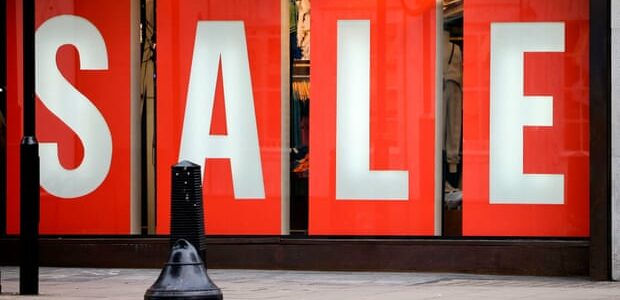
UK Christmas retail sales worse than expected
Retail sales in Britain staged only a weak recovery in December during the key Christmas shopping period to bring to an end the worst year for consumer spending on record, according to official figures.
The Office for National Statistics said the volume of British retail sales rose by 0.3% between November and December after the relaxation of the second national lockdown in England – far below economists’ forecasts for growth of 1.2% during the pivotal month for retailers.
Next drops bid to buy Topshop after Arcadia’s breakup
For the year as a whole, retail sales plunged by 1.9% as the coronavirus pandemic triggered the biggest annual decline on record despite a boom in spending online during lockdown.
According to the latest snapshot, spending in clothing stores jumped by 21.5% as consumer spending recovered from a large decline in November, when much of the high street was closed. Retailers reported a boost in sales at the beginning of the month as people shopped for Christmas presents before tougher restrictions were introduced and Boris Johnson’s government made a last-minute decision to scrap Christmas bubble measures for large parts of the country.
Despite the sharp rise in spending on fashion over the festive period, food sales shrank by 3.4%, falling back from a strong growth rate of 2.8% in November when supermarkets had benefited from the closure of pubs, restaurants and other non-essential retailers.
The figures come at the end of the worst year for retailers on record, with growing numbers of retailers facing financial ruin during the pandemic, leading to widespread store closures and job losses across the country. With fewer opportunities to socialise during the pandemic and many people working from home, clothing sales fared particularly badly, with a record annual fall of more than 25%.
Helen Dickinson, the chief executive of the British Retail Consortium, said retailers had not had the festive bounce in trade they had expected and that the new restrictions meant extra government help was needed urgently. “There was no Christmas cheer for retail as the industry found itself in the firing line for last-minute coronavirus restrictions,” she said.
“With no end in sight for retailers closed in lockdown, many will struggle to survive under a mounting rent burden, and a return to full business rates in April. The government should urgently announce an extension to the moratorium on aggressive debt enforcement and offer targeted business rates relief to the worst-affected businesses.
“Decisive action is needed to save jobs, shops and local communities, with town and city centres looking to be particularly hard hit unless the government acts now.”
Department stores and other shops, which includes jewellers, cosmetics and toy sellers, also reported record annual declines as the pandemic took its toll. However, with lockdown measures restricting spending in pubs and restaurants, and after a wave of stockpiling earlier in the year, food stores bucked the trends with a 4.3% annual growth rate – the highest since 2001.
The closure of much of the high street during lockdown and concerns about public health leading many shoppers to stay away from stores last year also fuelled a boom in online sales, with the total value of internet spending up by 46.1% on the year – the highest annual growth rate since 2008.
Jonathan Athow, the deputy national statistician for economic statistics at the ONS, said: “Some sectors were able to buck the trend in 2020. The increased popularity of click and collect and people buying more items from home led to a strong year for overall internet sales, with record highs for food and household goods sales online.”
Source: Read Full Article